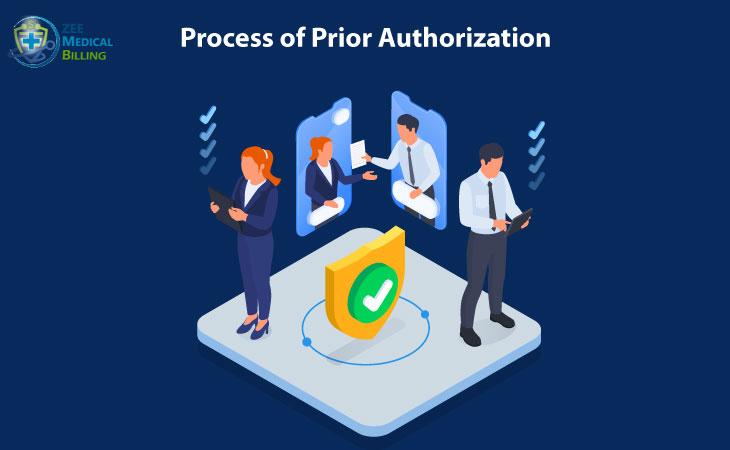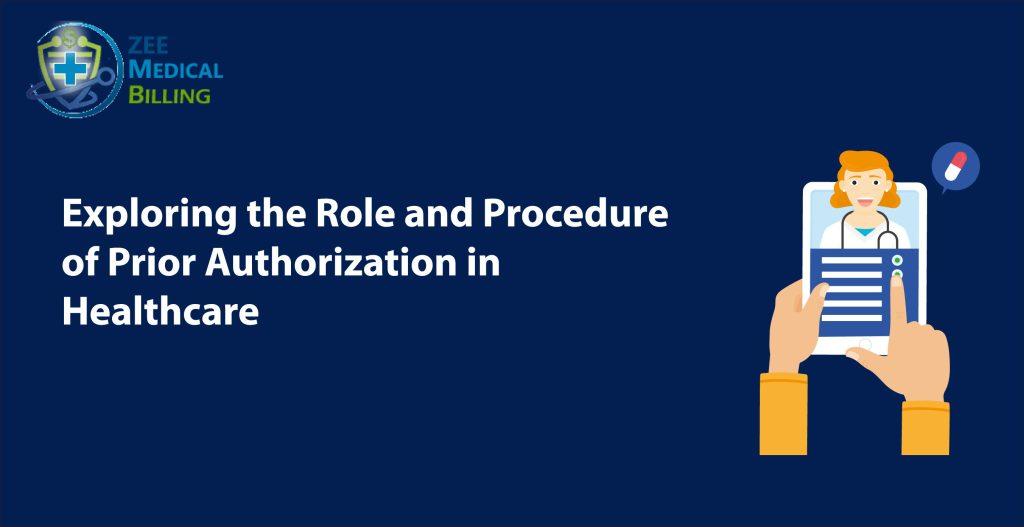Prior authorization in healthcare is an essential procedure that has a big impact on how medical services are delivered and how much patient care costs. Understanding its role and the procedural details involved is important for healthcare providers, administrators, and patients alike. That’s why we take this guide for you in which we’ll discuss each point and how crucial it is for medical billing. So let’s start it!
What is a prior authorization?
Prior Authorization, often abbreviated as PA, can also be called prior approval, prior notification, or prior review. Before some medical operations, treatments, drugs, or services are provided to a patient, insurance companies employ a process called prior authorization to assess their eligibility and need. In addition, this process ensures that the suggested plan of action complies with the insurance provider’s requirements, preventing unnecessary expenses and improving cost-effective medical care.
Furthermore, you can be responsible for the entire cost of your therapy if your health insurance plan does not cover it without prior permission. Payers employ PA as a strategy to lower costs, enhance care quality, and decrease the usage of unnecessary or low-value treatments. To assist in the creation and implementation of PA policies, healthcare payers hire doctors, nurses, and other medical experts.
In addition, let’s take an example to better understand the prior authorization
Imagine you’re experiencing persistent back pain, and your healthcare provider believes an MRI is necessary to identify the cause.
Prior Authorization Process:
- Your healthcare provider submits a prior authorization request to your insurance company.
- The request includes details like your medical history, symptoms, and the justification for the MRI.
- The insurance company reviews the request, ensuring the MRI is medically necessary and aligns with their policies.
- If approved, you can proceed with the MRI, confident that it’s covered by your insurance.
The Important Roles in the PA Process
Healthcare Providers
Healthcare providers play a pivotal role in the Prior Authorization process. It is their responsibility to submit detailed and accurate information about the proposed medical intervention to the insurance company. In addition, this information includes the patient’s medical history, the necessity of the procedure, and supporting documentation.
Medical Billing
Pre authorization in medical billing plays a pivotal role by facilitating the submission of comprehensive claims to insurance companies. When a healthcare provider identifies the medical necessity for a particular treatment or service, the subsequent step involves creating a detailed authorization request. Moreover, this request, accompanied by thorough medical records, diagnostic reports, and other relevant information, is submitted to the insurance company for review.
Insurance Companies
Insurance companies, on the other hand, carefully review the submitted information to assess the medical necessity and appropriateness of the proposed treatment. They follow established guidelines and criteria to make informed decisions regarding coverage.
Patients
While the Prior Authorization process primarily involves healthcare providers and insurance companies, patients are integral participants. Moreover, Patients need to be informed about the process and understand that certain treatments may require authorization, impacting the overall timeline of their healthcare journey.
Process of prior authorization

Understanding the procedural steps of Prior Authorization is crucial for seamless implementation. Lets see those steps:
Step 1: Identification of Necessity
The process begins with the identification of the medical necessity for a particular treatment or service. Healthcare providers assess the patient’s condition and propose a course of action based on their professional expertise.
Step 2: Submission of Authorization Request
Once the necessity is established, healthcare providers compile a comprehensive authorization request. This request includes medical records, diagnostic reports, and any other pertinent information that substantiates the need for the proposed medical intervention.
Step 3: Review by the Insurance Company
Upon submission, the insurance company diligently reviews the authorization request. They evaluate the medical necessity, appropriateness, and adherence to established guidelines. This step ensures that the proposed intervention aligns with industry standards and is economically viable.
Step 4: Authorization Decision
Following the review, the insurance company communicates its decision to the healthcare provider. If authorized, the provider can proceed with the planned medical intervention. However, if denied, further discussions or appeals may be necessary.
What Is the Duration of Prior Authorization?
The duration of Prior Authorization (PA) can vary significantly based on several factors, including the complexity of the medical intervention, the responsiveness of involved parties, and the efficiency of the authorization process. How long does a prior authorization take? while there is no fixed timeframe, it is based on different factors:
Standard Processing Time:
Routine Medications and Services: For routine medications or services, the standard processing time for Prior Authorization is typically within 1 to 3 business days. This assumes that all necessary documentation is provided promptly.
Complex Procedures or Medications:
Specialized Treatments: Complex medical interventions, such as specialty medications or intricate surgical procedures, may require a longer processing time. It’s not uncommon for these cases to take anywhere from 5 to 10 business days or more.
Urgent or Expedited Requests:
Emergencies or Urgent Cases: In urgent situations where immediate medical attention is required, insurance companies often offer expedited Prior Authorization processes. These requests aim to be resolved within 24 to 72 hours.
Factors Influencing Prior Authorization Timelines:
- Incomplete information may lead to delays
- communication gaps
- Communication Channels
- additional reviews by specialized teams
- late responses of insurance companies
- inefficiency of healthcare provider
Medications Requiring Prior Authorization:
The requirement for Prior Authorization (PA) is common for a variety of medications and healthcare services, serving as a mechanism to manage costs and ensure that medical interventions align with established guidelines. Moreover, Here’s an overview of the types of healthcare interventions that often necessitate Prior Authorization:
- High-cost specialty medications, including biologics and biosimilar drugs, often require PA due to their specialized nature and substantial financial implications.
- Certain brand-name medications with high associated costs may require Prior Authorization to ensure that cost-effective alternatives have been considered.
- Opioid analgesics and other controlled substances are often subject to Prior Authorization due to their potential for misuse and addiction.
- Innovative immunotherapies, especially those used in cancer treatment, frequently require Prior Authorization due to their specialized and often expensive nature.
- Some insurance plans implement step therapy, where patients must first try lower-cost medications before being approved for more expensive alternatives.
The Impact on Healthcare Delivery
The Prior Authorization process, while designed to streamline healthcare expenses, can have significant implications for healthcare delivery.
Enhanced Cost Management
One of the primary impacts of Prior Authorization on healthcare delivery is the promotion of enhanced cost management. Additionally, by necessitating approval before certain medical services are provided, the process serves as a proactive measure to control healthcare expenses. This in turn, benefits both insurance providers and patients, preventing unnecessary procedures that might contribute to financial strain.
Potential Delays in Treatment
While Prior Authorization aims to manage costs effectively, its impact on healthcare delivery is not without challenges. One significant challenge is the potential for delays in the administration of treatment. Moreover, the intricate review process undertaken by insurance companies can sometimes lead to extended waiting periods, impacting the timely provision of healthcare services.
Administrative Burden on Healthcare Providers
The impact of Prior Authorization extends to the administrative aspects of healthcare delivery, placing an additional burden on healthcare providers. Moreover, the extensive documentation and communication required for Prior Authorization submissions can divert resources from direct patient care.
Overcoming Challenges in the PA Process
While the Prior Authorization process is integral to cost-effective healthcare, it is not without its challenges.
Administrative Burden

- The extensive documentation required for PA submissions can create an administrative burden. Implementing streamlined documentation processes, leveraging technology where possible, can alleviate the workload on healthcare providers and administrative staff.
- Manual submission of PA requests can be time-consuming. Embracing automated submission platforms can expedite the process, reducing the administrative workload and minimizing the risk of errors.
Communication Gaps

- Communication gaps between healthcare providers and insurance companies can lead to delays and misunderstandings. Moreover, Establishing robust communication channels and protocols can enhance collaboration. Regular updates and clear guidelines facilitate a smoother PA process.
- Traditional communication methods may be inefficient. Leveraging technology, such as secure electronic communication platforms, ensures real-time information exchange, reducing the likelihood of misunderstandings.
Timely Follow-Up on Authorization Status

- Timely follow-up on PA requests can be challenging without proper tracking systems. Implementing tracking systems that provide real-time updates on the status of authorization requests enables healthcare providers to intervene promptly in case of delays.
- Patients may experience anxiety during the waiting period for PA approval. Proactively communicating with patients about the PA process, potential delays, and steps they can take to expedite the process empowers them and improves overall satisfaction.
Integration of Technology

It was a great challenge that Limited integration of PA processes with electronic health records. Integrating PA workflows with EHRs enhances efficiency by allowing seamless access to patient information and reducing the need for redundant data entry.
Why Zee Medical Billing Company for prior authorization?
Prior authorization is an expensive procedure for your business, due to its high time and resource consumption. That’s among the hardest things a medical practice can do. When it comes to prior authorizations, doctors, diagnostic providers, and payers must work closely together, unlike with other service activities like eligibility and benefits queries. Many medical practices thus want to contract with the best Medical Billing Company like Zee Medical Billing to handle the process. Furthermore, you can get numerous benefits when outsourcing your medical billing needs with Zee Medical billing services.
- Put an end to your paperwork troubles! By digitizing your records, Zee Medical Billing makes sure that your electronic submission is smooth and eliminates unnecessary paperwork.
- We care about good communication, not simply billing. Zee Medical Billing makes sure your prior authorization requests are clear and concise, preventing misunderstandings.
- Although our relationship with insurance companies can appear complex, we take the lead. Zee Medical Billing anticipates insurers’ demands and talks with them proactively to provide a seamless and productive working relationship.
- If you need speed in your medical practices then Zee Medical Billing is familiar with solutions. We look into opportunities for accelerated review to make sure your urgent circumstances receive the care they need.
- We think that coordination is important, that’s why Zee Medical Billing ensures peace by promoting open communication between patients and healthcare professionals.
Frequently Asked Questions
Prior authorization serves as a crucial checkpoint to ensure that medical procedures are both necessary and economically sound, preventing unnecessary costs and procedures.
If denied, healthcare providers and patients need to reassess the treatment plan, possibly opting for alternative procedures or navigating the appeal process.
The duration varies, but it typically takes a few days to a few weeks. Technological advancements aim to expedite this process in the future.
While prior authorization is a common practice, some healthcare providers explore alternatives, such as streamlined communication and utilization of predictive AI algorithms.
Yes, patients and healthcare providers have the option to appeal a denied prior authorization, providing additional information or clarifications to support the necessity of the procedure.





